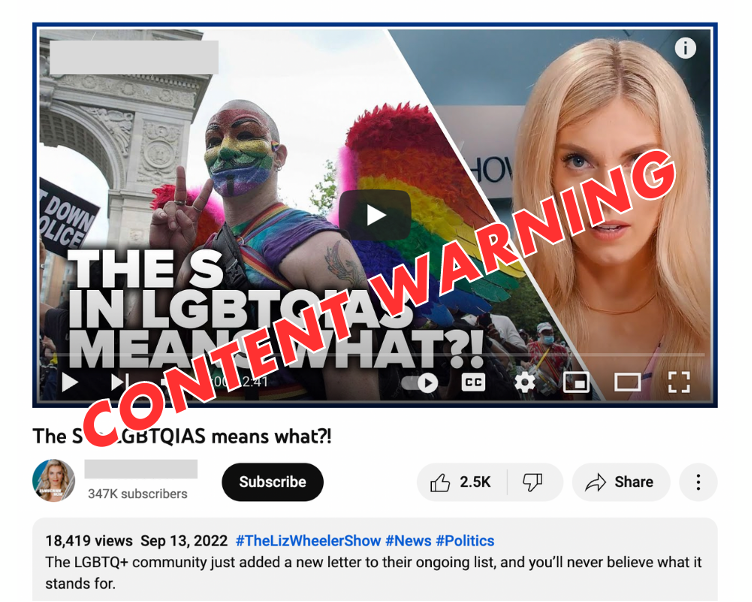Online Anti-LGBTQ Hate Terms Defined: “LGBTS” or “LGBTQIAS”
This entry is part of the GLAAD Guide to Anti-LGBTQ Online Hate and Disinformation, an ongoing project to identify some of the most prevalent and egregious terms, tropes, and concepts that are used to harass, attack, and spread malicious misinformation about LGBTQ people on social media. Learn more here.
*CONTENT WARNING*
The example below includes a hateful term, phrases and imagery.
“LGBTS” or “LGBTQIAS”

This anti-LGBTQ conspiracy theory falsely proclaims that the LGBTQ community has recognized “S,” standing for “Satanist” as part of the umbrella term. While the harmful trope of linking homosexuality to “evil” has existed for centuries, this online claim emerged in a September 2022 episode of “The Liz Wheeler Show,” on YouTube. Wheeler also made the claim during a longer segment of her show, in which she denounced the Respect for Marriage Act, a bill that would provide U.S. federal legal protection for same-sex and interracial marriages. An Associated Press fact check confirmed in September 2022 that the claim was false. YouTube subsequently demonetized Wheeler’s channel.
Besides being used as a provocative hate-driven trope to generate online engagement for profit, “LGBTS” aims to incite a moral, religious panic and to foster fear of LGBTQ people. Associating groups of people with demonic or other subhuman figures is a known method of dehumanization, which is prohibited by the hate speech policies of the major social media platforms. Like “LGBTP” (the “P” supposedly standing for pedophile”), the practice of falsely asserting the addition of letters to the LGBTQ acronym is a well-worn anti-LGBTQ hate and disinformation strategy. Explore more via GLAAD’s Guide to Anti-LGBTQ Online Hate and Disinformation.
Conclusion
This is just one example of anti-LGBTQ online hate and disinformation. Every term and concept should be evaluated in context. For instance, LGBTQ people and allies may use hashtags with hate terms as counterspeech, or slurs such as “tranny” or “dyke” may be used self-referentially to reclaim them. This guide will be updated on an ongoing basis. Please see the latest GLAAD Social Media Safety Index report for a deeper exploration of the current social media landscape for LGBTQ people, including GLAAD’s recommendations and thought leadership in the field.
How to Report Anti-LGBTQ Online Hate Speech and Harassment
Every major social media platform has policies which prohibit hate and harassment on the basis of protected characteristics, including sexual orientation and gender identity. To learn how to report potentially violative content, check out GLAAD’s LGBTQ Digital Safety Guide, which includes basic tips on helping our community be more safe online.
About the GLAAD Social Media Safety Program
As the leading national LGBTQ media advocacy organization, GLAAD is working every day to hold tech companies and social media platforms accountable and to secure safe online spaces for LGBTQ people. The GLAAD Social Media Safety Program produces the highly-respected annual Social Media Safety Index (SMSI) and researches, monitors, and reports on a variety of issues facing LGBTQ social media users — with a focus on safety, privacy, and expression.












